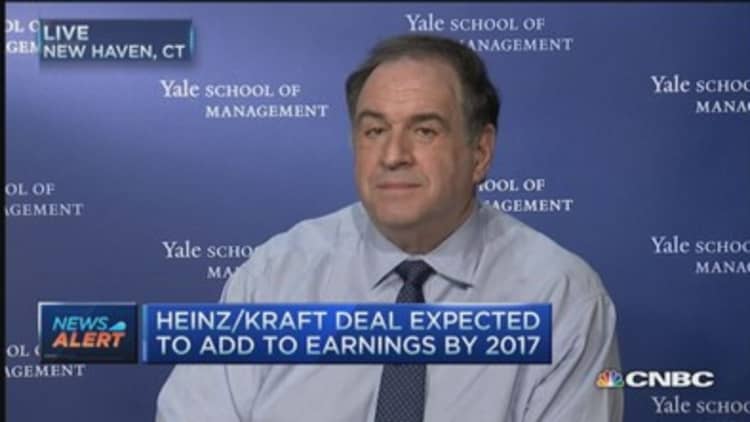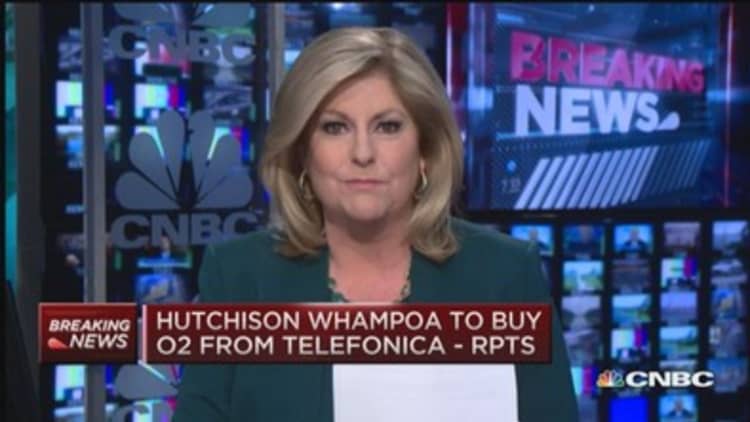Global deal-making is off to its fastest start since 2007, with the value of mergers and acquisitions struck in the first three months of 2015 up 21 per cent on the same period a year ago, to $811 billion.
Healthcare groups led the way, with a further three deals being announced on Monday. UnitedHealth Group said it was acquiring prescription management company Catamaran in a $12.8 billion all-cash deal, Horizon Pharma, a US-listed drug-maker, reached a $1.1 billion deal for Hyperion Therapeutics and Israel's largest drug-maker Teva Pharmaceuticals bought Auspex Pharmaceuticals for $3.2 billion.
But it was US ketchup maker Heinz that provided the highlight of the first quarter, with the biggest deal of 2015 so far. Its takeover of US consumer foods group Kraft — masterminded by Heinz's Brazilian owners 3G Capital and Warren Buffett — will create a company worth $100 billion including debt.
Heinz's move highlighted three major themes in global M&A this year: the prevalence of larger deals over smaller ones; the US as the center of deal-making activity; and the growing role of independent advisory firms. Neither Heinz nor Kraft relied on the services of a major global bank.

Deal-making has been supported by a continuation of the favorable market conditions that sparked an M&A revival last year. Cheap financing remains abundant, share prices are hovering at record highs and central banks are still working to stimulate the major economies.
Scott Barshay, co-head of the corporate department at US law firm Cravath, said: "M&A activity should continue to be strong . . . debt is cheap and readily available, the US economy is robust and confidence is high." He added: "We are likely to see more large-cap deals this year as confidence grows, given that many companies face fewer opportunities for organic growth."
Read more from the Financial Times:
Career planning: experts' advice for the second machine age
Stop, look and listen to the unwritten rules of life in China
Policy hopes help lift global stock markets
In the first quarter, M&A activity in the US was up 30 per cent to $399 billion — accounting for almost half of all deal-making. By contrast, deal volumes in Europe fell 4 per cent to $168 billion, according to data from Thomson Reuters.
This drop-off came as the European Central Bank said in January it would begin a program of quantitative easing by purchasing more than €1 trillion of assets by September 2016, in an attempt to stimulate economies in the eurozone.

Dietrich Becker, partner at Perella Weinberg in London, said the sluggishness in deal-making could be partly attributed to the cautious approach of the executives who have been running European companies since the financial crisis. "That mentality doesn't change quickly just because of interest rate cuts and the emergence of quantitative easing."
Only one deal in Europe ranked in the top 10 for the first quarter of 2015, the $15.4 billion takeover of Telefonica's UK subsidiary O2 by Hutchison Whampoa, the conglomerate that owns mobile operator Three.
Read MoreTelefonica agrees to sell O2 to Hutchison Whampoa
Hutch, controlled by Asian billionaire Li Ka-shing, also announced a massive $45.4 billion merger with Cheung Kong, Mr Li's other vehicle, along with plans to spin off the combined group's property assets. These moves helped to lift the value of Asia-Pacific deals by 63 per cent to $194 billion.
Private equity groups, however, have struggled to participate in the current M&A boom. Buyout volumes fell 52 per cent to $29.4 billion, marking the sector's weakest single quarter since the start of 2009.
Robin Rankin, co-head of global M&A at Credit Suisse, said: "Large-scale traditional leveraged buyout activity is less likely to materialize given valuations and reduced interest in consortium deals."
Steve Arcano, partner at law firm Skadden Arps, said leveraged lending guidelines applied by US regulators appear to be having an affect on the size of private equity deals. "For some funds, the ability to create returns on asset investments is likely being impacted by constraints on leverage," he said.

